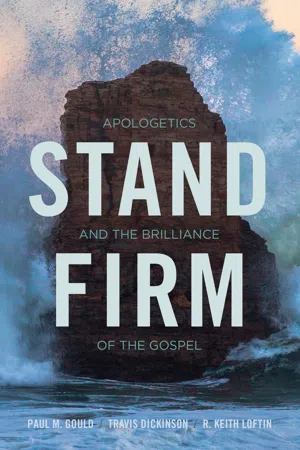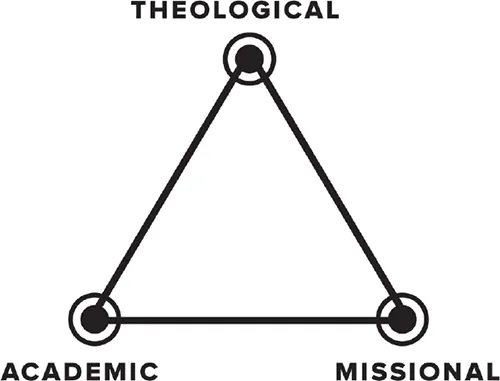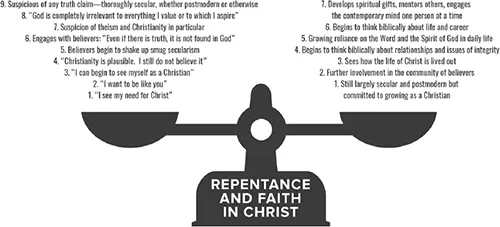CHAPTER 1
An Invitation to Apologetics
What comes to mind when you hear the word apologetics? What emotions surface when you think about doing apologetics? For some, apologetics is all the rage. It’s fun, exciting, cutting-edge, essential. For others, the idea of apologetics elicits little enthusiasm or perhaps, worse, some suspicion or even disdain. It’s “head over heart,” too intellectual, passé, irrelevant. For most, however, apologetics is something they know to be important, something they want to learn more about, and something that may be a little intimidating.
We write this book with all three camps in mind—the enthusiast, the suspicious, the open but intimidated—hoping to show the relevancy and importance of apologetics to evangelism, spiritual formation, and indeed, all of life. In fact, what we find in Christianity is a perfect joining together of reason and romance. Nowhere in Scripture is there a call to separate head (reason) and heart (romance) in our love of God and man. This is good news! Christianity does not require us to abandon the intellect or emotions. Christianity is both true and satisfying. Consider C. S. Lewis’s description of himself before conversion: “The two hemispheres of my mind were in the sharpest conflict. On the one side a many-island sea of poetry and myth; on the other a glib and shallow ‘rationalism.’ Nearly all that I loved I believed to be imaginary; nearly all that I believed to be real I thought grim and meaningless.” Lewis discovered that it was only in Christianity that his two hemispheres could be brought together into a coherent whole. In Christianity he had found a place to stand and a story that understood his longing for both how things are (truth) and how things ought to be (goodness and beauty). Christianity is true myth. That is why the first book Lewis wrote as a Christian, The Pilgrim’s Regress, was subtitled An Allegorical Apology for Christianity, Reason, and Romance. Lewis’s point in writing the allegory, which is also partly autobiographical, is that Christianity and Christianity alone affirms and honors reason without falling into a kind of calculating disembodied rationality as well as romance without falling into a kind of narcissistic and base sentimentality. What encouragement! God wants us to be whole people who love him with all of our being—which includes our minds, hearts, and wills—and likewise, to love others with our whole being too (as Jesus himself calls us to in Matt 22:37–39). In this introductory chapter, we hope to whet your appetite and set the stage for what follows by clearly articulating what apologetics is and why it matters.
What Is Apologetics?
Apologetics is not about apologizing to someone for being a Christian. The English word “apologetics” comes from the Greek word apologia, which means “defense.” The idea of presenting a credible defense of one’s position is nothing new. For example, in Plato’s Apology we read of the ancient Greek philosopher Socrates’s “apology,” or defense of his innocence, before a jury of Athenians against the charge of atheism and the corruption of youth. On April 16, 1963, Martin Luther King Jr. wrote his famous “Letter from Birmingham Jail,” in which he defended his nonviolent approach to opposing racism. Today, the so-called New Atheists, such as Richard Dawkins, Sam Harris, and Lawrence Krauss, are vocal apologists for atheism, as defended in best-selling books such as The God Delusion, Letter to a Christian Nation, and A Universe from Nothing.
So, what is apologetics? We define apologetics as an attempt to remove obstacles or doubts to, as well as offer positive reasons for, believing that Christianity is true and satisfying. In making a defense, the Christian apologist makes no explicit Christian assumptions; for example, she doesn’t assume Scripture is true and simply appeal to chapter and verse in defense of Christianity’s claims. Sometimes doubts or obstacles to faith will be intellectual, and sometimes they are due to a failure to imagine a world wherein Christianity is good and beautiful. Christian philosopher Peter Kreeft speaks of three prophets of the human soul: reason, which longs for truth; the conscience, which longs for goodness; and the imagination, which longs for beauty. All of these longings—for truth, goodness, and beauty—are fully satisfied in Christ. Thus, part of our job as apologists is to awaken these universal longings in those we seek to reach for Christ and point them, through reason (e.g., the deliverances of philosophy, history, science, and even commonsense observation), the conscience (e.g., through a life well lived and the pursuit of justice), and the imagination (e.g., through the use of literature, music, and art) to the One who is the ultimate object of our longings. This definition of Christian apologetics is broader than typical definitions, which focus merely on the rational defense of Christianity and the demonstration of its fundamental truth. Our suggestion is more holistic. By focusing on the whole person, we seek to provide a credible witness not only to the truth of Christianity but to its goodness and beauty as well. Additionally, our definition of apologetics is meant to be inclusive of both unbelievers and believers. Christians are not immune from struggling with doubts, misplaced desires, or failed imaginations. Apologetics, as we shall discuss momentarily, is beneficial to the believer as well as the unbeliever in helping to show the relevance of Christianity to all of life.
FIGURE 1.1 The Three Themes of Apologetics
Philosopher Greg Ganssle pushes toward this more robust view of apologetics when he speaks of three different sets of issues to consider in the doing of apologetics. First, there are theological issues, such as the nature and scope of common grace, the nature of man, the effects of sin, and the nature of general revelation, that inform our understanding and practice of apologetics. For example, in his speech to the god-fearing Greeks in Lystra (Acts 14:15–17), the apostle Paul appealed to the goodness of God and the common grace available to all: “. . . although [God] did not leave himself without a witness, since he did what is good by giving you rain from heaven and fruitful seasons and filling you with food and your hearts with joy” (v. 17). This is an example of what Randy Newman calls “joy-based apologetics”: appealing to the goodness and joy of life, available to all, as evidence for God. It also encourages us to think about our evangelism in terms of all that “we” share as humans, instead of the differences between “you” and “me.”
Second, according to Ganssle, apologetic issues include the academic or intellectual. This area encompasses most of what people think of when they think about apologetics. Staples include arguments for God’s existence, discussions of the problem of evil and hell, a defense of the historicity of the Bible, and the resurrection of Christ. Often what begins as a brief comment on some topic quickly turns into detailed discussions related to history, philosophy, science, archaeology, New Testament studies, sociology, mathematics, and more. This demonstrates that apologetics is very much a multidisciplinary field of study. This is as it should be. Since God is the creator of all distinct reality, it follows that all truths discovered (all knowledge gained) in every academic discipline somehow connect back to and illuminate the divine. Everything points to God!
Finally, there are missional issues relevant to the nature and task of apologetics. This area involves seeking to build bridges from a particular audience to the gospel. We must become “cultural exegetes,” learning about those we seek to reach—their beliefs, values, and emotional response patterns—so we can identify relevant starting points, adequate bridges (using the planks of reason, conscience, and imagination), and the various barriers to belief to be cleared so the gospel will get a fair hearing. One helpful diagnostic tool, suggested by Ganssle, is the idea of a spiritual mapquest. Just as you can input your current location and any desired destination into the website Mapquest and directions will pop up, so too we must learn accurately to diagnose where an unbeliever is spiritually—his or her “current location”—so we can accurately discern the stages and processes the person must go through in order to grasp and apply the message of the gospel—the destination. Something like the Diagnostic Scale provided by Ganssle will help us think more carefully about the spiritual, intellectual, and emotional condition of those we seek to reach with the gospel.
In this book we hope to bring together all of these considerations related to the nature and task of apologetics in such a way that a person, as a whole person, will, with the help of the Holy Spirit, see and believe that Christianity is true and satisfying.
FIGURE 1.2 The Diagnostic Scale
Is Apologetics Biblical?
Part of our goal in this book is to offer a more robust view of apologetics. Apologetics is a rational enterprise, but it is not merely a rational enterprise. It is much more. We think apologetics is essential to faithfulness unto Christ. It points us to the brilliance, beauty, and truth of the gospel. Still, there are some who think apologetics is unbiblical. The idea behind the “apologetics is unbiblical” charge is that our job as Christians is simply to preach the gospel, or merely repeat the words of Scripture, and to sit back and...


